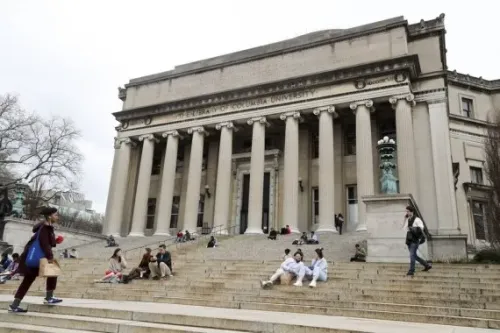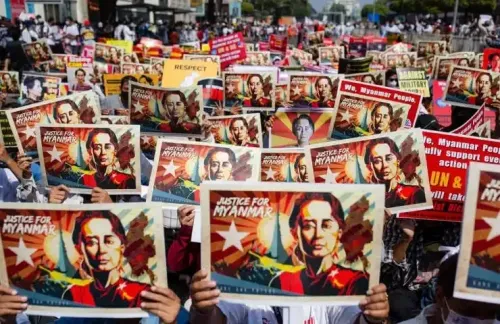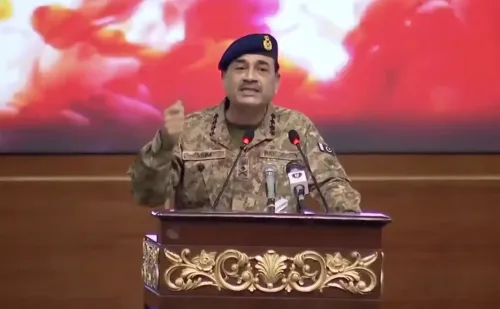Is the Awami League Managing Discontent Among Its Supporters?

Synopsis
Key Takeaways
- Awami League is trying to maintain calm among supporters.
- Protests are anticipated to escalate.
- The ICT verdict against Sheikh Hasina has been labeled as politically motivated.
- There are concerns over Pakistan's influence in Bangladesh.
- Chowdhury warns of potential chaos ahead.
New Delhi, Nov 17 (NationPress) Following the announcement of a nationwide strike on Tuesday and protests expected to commence from November 19, Bangladesh's Awami League has stated that it is striving to keep its supporters “calm” in light of the “illegal” ruling delivered by the International Crimes Tribunal (ICT), which was criticized as a “farcical trial” against former Prime Minister Sheikh Hasina.
“Certainly, we anticipate protests escalating across the nation in the upcoming days. We are making efforts to maintain our followers' composure. Our focus is on encouraging peaceful protests rather than resorting to violence. We aim to avoid the indiscriminate killings and destruction of property that occurred last year due to actions taken by the BNP (Bangladesh Nationalist Party), Jamaat (Bangladesh Jamaat-e-Islami), and certain student groups. Our goal is to foster peaceful expressions of dissent and gather public support for the removal of this regime,” stated former Bangladesh Minister Mohibul Hasan Chowdhury in an interview with IANS.
Chowdhury's remarks followed the ICT's verdict on Monday, which handed down a death sentence against the former Prime Minister for alleged “crimes against humanity” linked to protests that took place in July 2024.
In the interview, Chowdhury expressed concern that the situation in Bangladesh is likely to deteriorate further in the aftermath of Monday's verdict.
“Instead of a thorough investigation and a fair trial, the authorities have opted for a destructive approach, conducting a one-sided trial that embodies a sham and farce. We expect the coming days to be increasingly unstable, marked by protests and chaos,” he commented.
“This trial was anything but fair. From the outset, it was politically charged. The amendments to the law were completely illegal, as this government lacks the authority to implement such changes. The accused had no legal representation. Prominent lawyers from Dhaka sought to defend Sheikh Hasina but were denied the opportunity. Instead, the interim government appointed a Jamaat-e-Islami member as her legal representative, who was evidently colluding with the prosecution. The judgment appeared to be premeditated, aimed at preventing her from participating in future elections,” he elaborated.
The former minister also pointed out the increasing influence of Pakistan in Bangladesh.
“India is well aware of the ongoing situation in Bangladesh. Militant groups from Pakistan, such as Lashkar-e-Taiba and Jaish, have announced intentions to establish branches here. Operations by the ISI have reportedly begun from the Pakistan High Commission in Dhaka, and senior Pakistani military officials are visiting Bangladesh. Consequently, India recognizes that Bangladesh is being transformed into a hub for terrorism, posing a threat to regional stability. In our administration, we dismantled terrorist networks and prevented ISI operations in Bangladesh. Currently, they seem to be re-establishing their presence and exerting control over the Yunus government, which is detrimental to Bangladesh’s future,” Chowdhury remarked.
He cautioned that the Yunus government's alignment with Pakistani military intelligence could ultimately lead to the country's downfall.
“Their actions will harm the nation. They represent a small faction, not the majority's interests. The sooner they are removed, the better for the country. Currently, the outlook for Bangladesh's future does not appear very bright,” he concluded.









